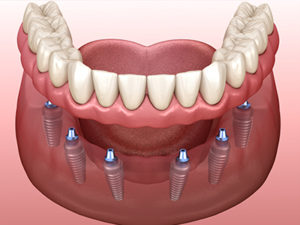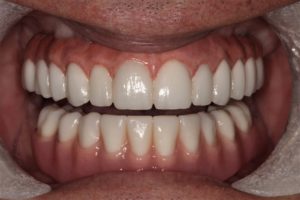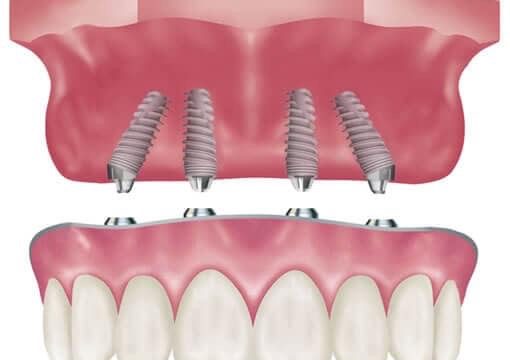
Are you struggling with the inconvenience and discomfort of traditional dentures? Have you been searching for a more stable and natural-looking solution to replace your missing teeth? Look no further! Denture supported implants might be the perfect solution for you. This revolutionary dental treatment not only restores the function and appearance of your smile but also provides a more secure and comfortable alternative to traditional dentures.
In this blog post, we’ll delve into the world of denture supported implants, discussing their benefits, cost, types, and the process of getting them. We’ll also explore financing and insurance options, as well as the importance of proper care and maintenance for these life-changing dental appliances. So, let’s embark on this journey towards a more confident and beautiful smile!
Key Takeaways
- Denture supported implants offer a more secure, natural-looking and comfortable alternative to traditional dentures.
- The cost of these implants is determined by the quality of the dentures, number of implants needed and any preparatory procedures required.
- Regular daily cleaning, maintenance, professional cleanings and dental checkups are necessary for proper care in order to ensure longevity & reap associated benefits.
Understanding Denture Supported Implants
Implant dentures are a game-changer for individuals who have lost most or all of their natural teeth, as well as those missing several teeth in different areas. These dental appliances offer a more stable and comfortable alternative to traditional dentures by attaching directly to the jawbone using titanium screws or mini dental implants. This secure foundation not only provides improved function and appearance but also helps maintain the natural look and structure of the jaw and lower third of the face. With smile dental implants, patients can enjoy the benefits of implant dentures that closely resemble their natural teeth.
Factors like the number of implants, dentures quality, and preparatory procedures influence the cost of implant-supported dentures. However, many patients find that the benefits of this innovative dental treatment far outweigh the costs, as they enjoy a more natural-looking smile and improved quality of life.
How Denture Supported Implants Work
The denture attaches directly to the jawbone through dental implants in denture-supported implants, which serve as a substitute for missing teeth roots. These implants provide a reliable base for the denture, ensuring it remains firmly in place when eating or speaking. For those considering dental implants in Rockville, these implants offer a secure and natural solution for missing teeth. As a result, patients can enjoy a more comfortable fit and a more natural-looking smile without the fear of displacement.
Obtaining denture supported implants involves two main steps. The initial surgery involves placing implants into the jawbone, followed by a second surgery to affix abutments. After a recovery period, custom dentures are made and attached to the abutments. This meticulous planning and multiple visits to the dentist ensure the best possible outcome for the patient, resulting in a stable and aesthetically pleasing solution to tooth loss.
Comparing Denture Supported Implants to Traditional Dentures
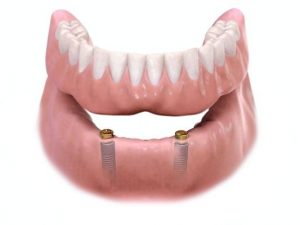
Denture supported implants present several benefits compared to traditional dentures. For starters, they have a much greater longevity, with the potential to last for decades, whereas traditional dentures often require replacement every few years. Additionally, the enhanced stability and comfort provided by implant-supported dentures allow patients to eat and speak with confidence, knowing their dentures will remain firmly in place.
Snap-on dentures, a type of implant retained dentures, also offer superior support and reduce slippage when compared to traditional dentures. This translates to improved speech and chewing capabilities, which can significantly enhance a patient’s overall quality of life. Addressing underlying oral health concerns, such as gum disease or tooth decay, is essential for the success of implant-supported dentures.
Types of Denture Supported Implants
Various types of denture supported implants exist to meet individual requirements, not all are the same. Dentists often recommend implant supported dentures for patients with tooth loss who seek a more stable and comfortable solution. The two primary types of implant supported denture are full and partial dentures, providing options depending on the extent of tooth loss experienced by the patient.
The cost of treatment with denture supported implants can vary depending on the type chosen, with full dentures typically requiring more implants and a higher overall expense. However, both full and partial denture supported implants offer an improved quality of life and a more natural-looking smile when compared to traditional dentures.
Full Denture Supported Implants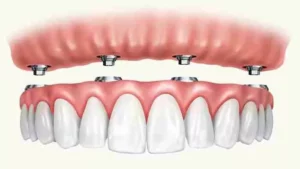
New implant supported dentures, or implant-supported dentures, aim to replace a complete arch of teeth. Unlike traditional dentures that sit on the gums, implant-supported dentures are more secure and stable as they are affixed to dental implants in the jawbone. This secure foundation not only enhances the overall function and appearance of the denture but also helps maintain the natural look and structure of the jaw and lower third of the face.
The process for obtaining full denture supported implants typically includes a consultation and evaluation, implant placement and healing, as well as denture fabrication and fitting. The cost of full denture supported implants is impacted by the number of implants needed, the quality of the dentures, and any preparatory procedures that may be required.
Partial Denture Supported Implants
Designed to replace a few missing teeth, partial denture supported implants are a prosthetic device that attaches to implants for better stability and support. They also work well in conjunction with existing teeth, providing a more affordable and less invasive option for those who have only lost a few teeth.
The mechanism of action for implant supported partial dentures involves mini implant-supported upper dentures, which offer a cost-effective alternative to traditional dental implants while still providing an aesthetically pleasing result. The cost of partial denture supported implants depends on the number of implants required, the quality of the dentures, and any preparatory procedures that may be necessary.
The Process of Getting Denture Supported Implants
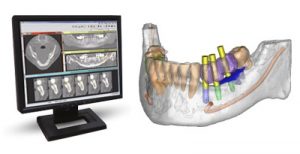
Several steps are involved in the journey towards a beautiful smile with denture supported implants, including:
- Consultation
- Implant placement
- Healing
- Denture fabrication and fitting
Each stage of the process is crucial in ensuring the best possible outcome and overall satisfaction with the treatment.
Preparatory procedures, such as bone grafts or treatment for oral health concerns, may be required before the placement of dental implants. These procedures aim to create a solid foundation for the implants and address any underlying issues that could hinder the success of the treatment.
Consultation and Evaluation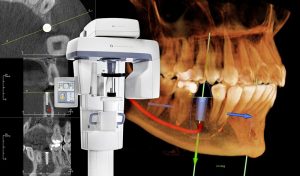
A consultation and evaluation with a dentist or oral surgeon is necessary before starting treatment with denture supported implants. During this consultation, the dentist will:
- Conduct an oral examination
- Review the patient’s medical history
- May request x-rays or CT scans to assess the patient’s oral health and evaluate their candidacy for denture supported implants.
The initial evaluation plays a critical role in establishing the correct treatment plan for the patient. By thoroughly assessing the patient’s oral health and needs, the dentist can determine the best course of action for achieving optimal results with denture supported implants.
Implant Placement and Healing
In the process of getting denture supported implants, implant placement and healing are vital steps. Here is an overview of the process:
- Implants are inserted into the jawbone via a minor incision during the initial operation.
- Several visits to the dental practitioner are necessary for implant positioning, impressions, and eventual restoration.
- This process necessitates meticulous planning and multiple visits to ensure the best possible outcome.
On average, implants take three to six months to heal properly. The healing process may be affected by a variety of factors, such as the patient’s general health, the number of implants inserted, and the quality of the implant materials. Adhering to appropriate aftercare is indispensable for successful implant placement and healing, which entails following the dentist’s recommendations for cleaning and upkeep, as well as frequent dental examinations.
Denture Fabrication and Fitting
Denture fabrication and fitting are the final steps in the process of obtaining denture supported implants. This stage involves:
- Taking impressions of the patient’s oral cavity
- Constructing a model of the denture
- Adjusting the denture to the patient’s mouth for optimal fit and comfort.
The cost of denture fabrication and fitting can vary depending on the type of denture selected and the dentist’s fees. However, investing in high-quality dentures and professional fitting can significantly impact the overall satisfaction and success of the treatment.
Factors Affecting the Cost of Denture Supported Implants
Several factors can cause the cost of denture supported implants to vary significantly. These factors include:
- The quality of the denture
- The quantity of implants necessary
- The dentist chosen for the procedure
- Preparatory procedures necessary
- Geographical area
- Type of implants
When considering the cost of denture supported implants, it’s vital to take these factors into account. By understanding the factors that influence the overall cost, patients can make more informed decisions about their treatment and ensure they receive the best possible care within their budget.
Number of Implants Required
The number of implants required for denture support directly affects the overall cost of the treatment. More implants generally result in a higher price, as each implant incurs additional expense. However, it’s important to note that investing in an adequate number of implants can significantly impact the success and longevity of the treatment, ensuring a stable and secure foundation for the dentures.
On average, four to six implants are necessary to support a full denture, while partial dentures may require fewer implants. The exact number of implants needed will depend on the patient’s unique needs and the dentist’s recommendations.
Quality of Dentures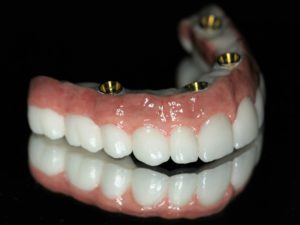
The quality of dentures plays a significant role in the overall cost of denture supported implants. High-quality dentures typically come at a higher price but offer better aesthetics, durability, and improved functionality.
Denture quality can vary widely, with prices ranging from $300 to $5,000. It’s important for patients to carefully consider the quality of dentures when weighing the implant supported dentures cost. By investing in high-quality dentures, patients can ensure a more comfortable fit, a natural-looking smile, and a longer-lasting dental solution.
Preparatory Procedures
Preparatory procedures, such as bone grafts or treatment for oral health concerns, can increase the overall cost of denture supported implants. These procedures aim to create a solid foundation for the implants and address any underlying issues that could hinder the success of the treatment.
The estimated cost of a bone grafting procedure typically ranges between $600 and $2,600. It’s crucial for patients to understand the potential need for preparatory procedures and factor these costs into their overall budget for denture supported implants.
Financing and Insurance for Denture Supported Implants
Although denture supported implants can be a sizable investment, financing and insurance options exist to make the treatment more affordable and accessible. Dental insurance may partially cover the cost of denture supported implants, depending on the policy and treatment plan. Additionally, third-party financing options can help spread the cost over time, making the treatment more manageable for patients.
When considering denture supported implants, patients need to explore these financing and insurance options. By understanding the available options and working closely with their dentist, patients can find a solution that fits their budget and ensures access to this life-changing dental treatment.
Dental Insurance Coverage
Dental insurance may provide coverage for denture supported implants, depending on the policy and treatment plan. The coverage for denture supported implants under dental insurance may vary depending on factors such as the number of implants required, the quality of the dentures, and any preparatory procedures that may be necessary.
To determine if their dental insurance covers denture supported implants, patients should contact their dental insurance companies and discuss their specific policy and treatment plan. This can help patients better understand the potential coverage and financial responsibility they may face when pursuing denture supported implants.
Third-Party Financing Options
Third-party financing options, such as CareCredit, Proceed Finance, and ONEderful Finance, can help make denture supported implants more affordable by spreading the cost over time. These financing options provide patients with reduced interest rates, adaptable payment plans, and the capability to divide the expense of denture supported implants over a period.
When selecting a third-party financing option, it’s important for patients to take into account the interest rate, repayment terms, and any additional fees or charges associated with the financing option. Additionally, patients should compare different financing options to determine the best option for their needs and budget.
Caring for Your Denture Supported Implants
To maintain optimal oral health and ensure their longevity, denture supported implants require proper care. This involves daily cleaning and maintenance, such as brushing and flossing, as well as regular professional cleanings and dental checkups.
By adhering to these care guidelines and working closely with their dentist, patients can enjoy the many benefits of denture supported implants for years to come. Some of the benefits include:
- A stable and secure fit
- Improved chewing and speaking ability
- Enhanced facial appearance and confidence
- Prevention of bone loss in the jaw
- Easy maintenance and cleaning
A well-maintained set of denture supported implants can significantly improve a patient’s quality of life, offering a stable, comfortable, and natural-looking solution to tooth loss.
Cleaning and Maintenance
Daily care and maintenance of denture supported implants include twice-daily brushing with a soft-bristled toothbrush, daily flossing, and professional cleanings as advised by the dentist. These practices help prevent plaque and tartar accumulation, which can lead to gum disease and other dental issues.
Investing in the proper care and maintenance of denture supported implants not only ensures their longevity but also promotes overall oral health. By following their dentist’s recommendations and engaging in a consistent oral hygiene routine, patients can enjoy the many benefits of denture supported implants for years to come.
Regular Dental Checkups
To maintain the health and function of denture supported implants, regular dental checkups are critical. During these checkups, the dentist will examine the patient’s teeth and gums, assess the condition of the implants, and address any potential issues or concerns.
By attending regular dental checkups, patients can ensure any issues are detected early and addressed promptly, minimizing the need for more extensive and costly treatments down the line. A proactive approach to dental care is essential for the long-term success of denture supported implants and overall oral health.
Summary
In conclusion, denture supported implants offer a revolutionary solution for individuals struggling with tooth loss and traditional dentures. By providing a more stable, comfortable, and natural-looking alternative, denture supported implants can significantly improve a patient’s quality of life and confidence in their smile.
Understanding the different types of denture supported implants, the process of obtaining them, and the factors that influence their cost is essential for anyone considering this life-changing dental treatment. With proper care and maintenance, denture supported implants can offer a long-lasting solution to tooth loss, helping patients enjoy the many benefits of a healthy and beautiful smile.
Frequently Asked Questions
Are implant supported dentures worth it?
Implant-supported dentures are more expensive up front but they offer long-term cost savings and require less maintenance, making them well worth the investment.
How long do implant supported dentures last?
Implant-supported dentures can last between 10 and 40 years, though some may come apart in a shorter time frame.
What is the difference between implant supported dentures and implants?
Implant-retained dentures use 2-4 dental implants for support and can be removed for cleaning, whereas implant-supported dentures use 4-6 dental implants for complete support with the added benefits of natural chewing function, prevention of bone loss and facial changes.
Why are implant supported dentures so expensive?
Given that four to six implants are typically needed to support a full denture, and that some techniques require as many as four implant posts, it is understandable why implant supported dentures can be an expensive option.
What are the main benefits of denture supported implants?
Denture supported implants provide greater stability, increased comfort, and a more aesthetically pleasing result than traditional dentures, giving you a beautiful smile.
Please select service, date and provider then click on the Find Appointments button.


